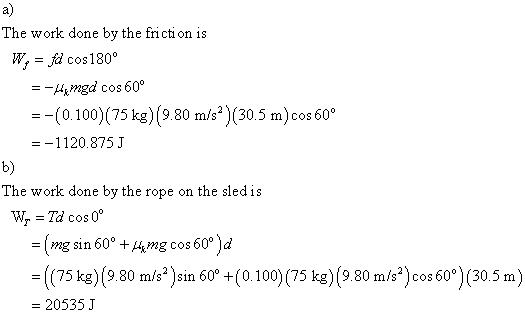Problem 5: Suppose the ski patrol lowers a rescue sled carrying an injured skiier, with a combined mass of 75 kg, down a 60.0° slope at constant speed, as shown in the Figure. The coefficient of kinetic friction between the sled and the snow is 0.100. w 60° Part (a) How much work, in joules, is done by friction as the sled moves 30.5 m along the hill? Numeric : A numeric value is expected and not an expression. We = Part (b) How much work, in joules, is done by the rope on the sled over this distance? Numeric : A numeric value is expected and not an expression. W. = Part (c) What is the work, in joules, done by the gravitational force on the sled? Numeric : A numeric value is expected and not an expression. Wg = Part (d) What is the net work done on the sled, in joules? Numeric : A numeric value is expected and not an expression.
Problem 5: Suppose the ski patrol lowers a rescue sled carrying an injured skiier, with a combined mass of 75 kg, down a 60.0° slope at constant speed, as shown in the Figure. The coefficient of kinetic friction between the sled and the snow is 0.100. w 60° Part (a) How much work, in joules, is done by friction as the sled moves 30.5 m along the hill? Numeric : A numeric value is expected and not an expression. We = Part (b) How much work, in joules, is done by the rope on the sled over this distance? Numeric : A numeric value is expected and not an expression. W. = Part (c) What is the work, in joules, done by the gravitational force on the sled? Numeric : A numeric value is expected and not an expression. Wg = Part (d) What is the net work done on the sled, in joules? Numeric : A numeric value is expected and not an expression.
Related questions
Question
Work and Kinetic Energy Q5: Please answer parts a-c step by step and explain each step (even if minor) in detail please.

Transcribed Image Text:Problem 5: Suppose the ski patrol lowers a rescue sled carrying an injured skiier, with
a combined mass of 75 kg, down a 60.0° slope at constant speed, as shown in the
Figure. The coefficient of kinetic friction between the sled and the snow is 0.100.
w
60°
Part (a) How much work, in joules, is done by friction as the sled moves 30.5 m along the hill?
Numeric : A numeric value is expected and not an expression.
Wf=
Part (b) How much work, in joules, is done by the rope on the sled over this distance?
Numeric : A numeric value is expected and not an expression.
Wr
Part (c) What is the work, in joules, done by the gravitational force on the sled?
Numeric : A numeric value is expected and not an expression.
W.
g
Part (d) What is the net work done on the sled, in joules?
Numeric : A numeric value is expected and not an expression.
W,
net
Expert Solution
Step 1

Trending now
This is a popular solution!
Step by step
Solved in 2 steps with 2 images
